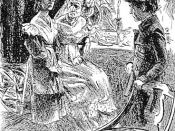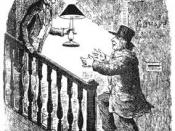Criticisms of Great Expectations: Psychoanalytic and Gender Perspectives Psychoanalytic and gender literary criticisms are important as individual analyses and are similar in some respects, namely sexual and gender issues, which make them ideal choices for analyzing Great Expectations. Reading the novel from a psychoanalytical perspective invites an interpretation based on symbols, repression, dreams, and the nature of the conscious vs. the unconscious mind. The central thesis of psychoanalytical criticism is based on the theories of Sigmund Freud, who recognized the link between literary works and human psychology. Just as Freud's theories on human psychology have changed the way in which the world thinks, so has psychoanalytical criticism changed the way literature is read and studied. If, by understanding human psychology according to Freud, we can appreciate literature on a new level, then we should acquaint ourselves with his insights. (464) A gender criticism of the novel can be based in deconstructing oppositions in the text that are related to gender issues, such as masculine vs.
feminine and heterosexual vs. homosexual. Gender criticism evolved from feminist criticism in the early 1980s, raising issues "that are endlessly contested and perhaps necessarily problematic." (558) Peter Brooks's essay on repetition and repression in the plot of Great Expectations is especially useful because Brooks presents the psychoanalytic criticism through the text itself, not through the characters. A Freudian approach to literature views the plot of the text as the object to be analyzed - the patient, if you will. Dickens uses plot and manipulation of plot effectively throughout the novel until the end, when, as Brooks says, "none of the schemes machinated by the characters manages to accomplish its aims" (496). Brooks uses Freud's theory of the relationship between the ego and the id, or the conscious and the unconscious, as though...


